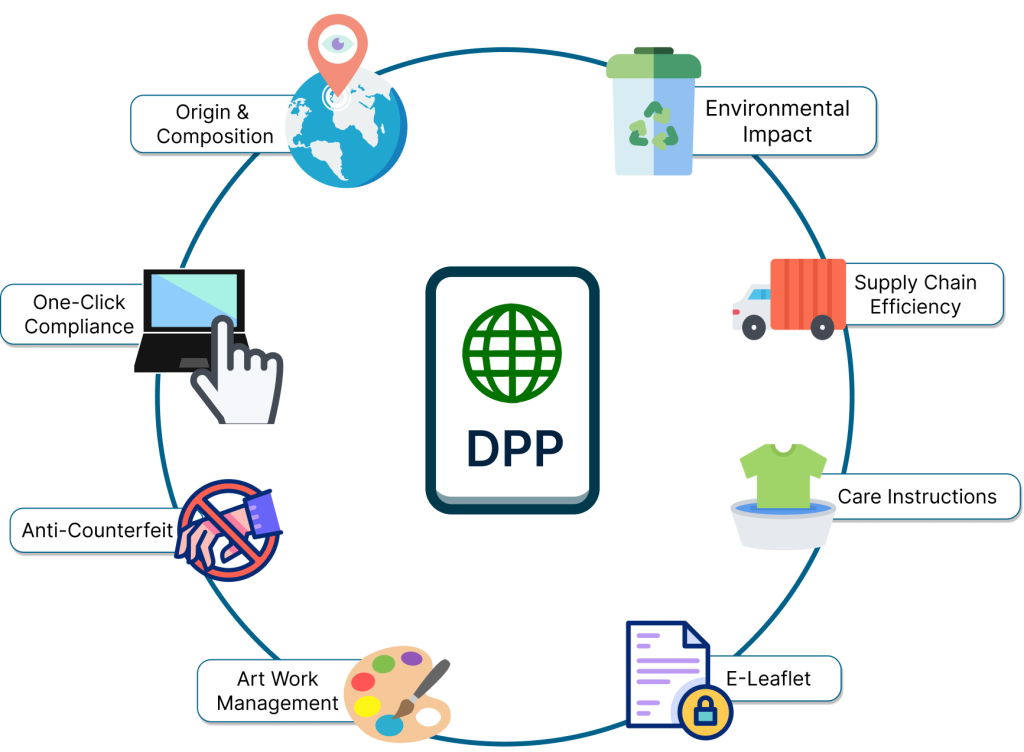
Empowering Sustainable and Transparent Supply Chains
The Digital Product Passport ssolution that unlocks traceability, circularity, and consumer trust.

Evidnt empowers businesses with Digital Product Passports in several key ways

Enable traceability at different levels
- Product Level: Traceability at the product level focuses on tracking generic product information without specific lot or serial number details.
- Lot Level: Lot-level traceability allows tracking of batches or lots of products, ensuring quality and consistency within a group.
- Item Level: Item-level traceability provides visibility to each end product bought by the end user, ensuring detailed tracking and accountability

Origin & Composition
Evidnt provides insights into product origin and composition, enabling manufacturers to maintain transparency.

One-Click Compliance
Streamlining compliance processes, Evidnt makes it easy for manufacturers to adhere to regulations.

Anti-Counterfeit Measures
Evidnt helps manufacturers combat counterfeit products, allowing end users to verify authenticity.

E-Leaflets
By enabling digital leaflets, Evidnt enhances communication with consumers.

Care Instructions
Evidnt Apparel Dpp can include washing instructions, dry cleaning guidance, ironing recommendations, and any necessary professional care instructions

Supply Chain Efficiency
Optimizing supply chain processes, Evidnt improves overall efficiency.

Environmental Impact
Evidnt allows manufacturers to showcase their sustainability values and impacts to their end users.

Artwork Management
Artwork management handles the creation, approval, and upkeep of packaging and labeling to ensure regulatory compliance and brand consistency.
USE CASES
A Digital Product Passports (DPPs) provides detailed digital records of a product's origin, materials, and sustainability practices.

Digital Product Passport for
Battery
A Battery Digital Product Passports (DPP) is a secure digital record that provides comprehensive information about a battery’s entire lifecycle. From raw material sourcing and manufacturing to performance history and end-of-life management, the DPP enhances transparency, enabling responsible choices for manufacturers, recyclers, and consumers.
Traceability & Accountability
Track the battery's journey throughout its lifecycle, ensuring responsible sourcing, ethical manufacturing, and efficient recycling
Circular Economy Enabler
Facilitate responsible recycling and material recovery by providing detailed information about the battery's composition and previous life
Regulatory Compliance
Streamline compliance with evolving regulations on battery traceability, transparency, and sustainability reporting
Dynamic Data Updates
The Digital Product Passports (DPP) is continuously updated throughout the battery's lifecycle, providing real-time insights into performance and usage patterns
Sample Data for Battery DPP
Every battery receives a unique and secure digital identifier, like a fingerprint. This Battery Passport Number provides a direct link to its comprehensive digital twin, accessible throughout its lifecycle.
This section outlines the essential technical specifications of the battery, including its capacity, voltage, and intended applications. It also shows detailed information about the manufacturer, including their location, and promoting accountability and trust.
Understanding the environmental impact is crucial. The passport quantifies the battery’s carbon footprint from raw material extraction to manufacturing, enabling informed decisions for a greener future.
Ethical sourcing is paramount. This section provides insights into the battery’s supply chain, including the origin of raw materials and adherence to responsible sourcing standards.
Shipment data and packaging data for each lot/ serial number can be shown to users and access can be restricted within the manufacturing unit.
Detailed information on the battery’s chemical makeup, including the types and quantities of materials used, is crucial for efficient recycling and promoting a circular economy.
Information such as ease of disassembly, material recoverability, and potential for second-life applications.
Track performance data, including charging cycles, capacity retention, and operating temperatures, providing valuable insights into battery health and longevity.
Certain Information like detailed compositions , test certificates are accessible only to authorized personals

Digital Product Passport for
Fashion & Apparels
A Digital Product Passports (DPPs) for an apparel line is a digital record that provides detailed information about each garment. This includes data on materials, manufacturing processes, origin, and sustainability credentials. It enhances transparency, enabling consumers to make informed choices, and supports the circular economy by facilitating recycling and reuse.
Transparency & Compliance
Creating Digital Product Passports (DPPs) for Apparel enables companies to enhance transparency, build customer trust, and comply with E.U. regulations.
Sustainability Data
Apparel Digital Product Passports (DPPs) include item-level details such as company information, raw materials, and manufacturing processes.
QR Code Access
Companies can provide customers with a QR code, either on the product or in accompanying materials. Scanning the QR code reveals the Digital Product Passport for Apparel.
Circular Economy Support
Apparel DPPs contribute to a circular economy by delivering sustainability data at the product level.
Sample Data for an Apparel DPP
Unique Passport number generated at product, lot or item level.
Season, Description, Quantity, Size, Style, Image
Manufacturing location, lot/batch number, manufacturing & expiry date
Washcare instructions as required for the product.
Eg. Washing, drying, professional care, bleaching, ironing
Raw Material Name, percentage, description
Carbon footprint data, Water and energy saved, recycling data
Digital leaflet containing relevant product/company information
Shipment data and packaging data for each lot/ serial number can be shown to users and access can be restricted within the manufacturing unit.

Wine &
Beverages
A Digital Product Passports (DPPs) for wine & beverages provides detailed information about a wine’s lifecycle, including vineyard origin, grape varieties, production methods, quality certifications, sustainability practices, and distribution history. It enhances transparency and traceability, helping consumers make informed choices and ensuring the wine’s authenticity and compliance with industry standards.
Wine Traceability and Authenticity
DPPs can provide detailed information about the origin of the wine, including the vineyard, grape varieties, and production methods. This transparency enhances consumer trust and ensures the authenticity of the product.
Environmental Impact Assessment
Wineries can use this information to assess their environmental impact and make informed decisions to reduce their carbon footprint.
Health and Safety Information
Digital Product Passports (DPPs) can include health-related details, such as allergen information, sulfite levels, and recommended consumption guidelines.
Wine Aging and Storage Recommendations
Digital Product Passports (DPPs) can provide guidance on optimal storage conditions for different types of wine (e.g., temperature, humidity, light exposure).
Circular Economy Initiatives
Wineries can share information about bottle recycling programs, encouraging consumers to return empty bottles for proper disposal or reuse.
Sample Data for a Wine & Beverages DPP
Unique Passport number generated at product, lot or item level.
Vintage Year, Appellation & Origin, Wine Type, Color, Alcohol %, Volume, PRODUCED BY, IMPORTED BY, BOTTLED BY etc,.
Lot, manufacturing date, Production count
Raw Material Name, percentage, description , origin , harvest lot
Carbon footprint data, Water and energy saved, recycling data
Vineyard details, climatology, winemaking process details

Pharmaceuticals
A Digital Product Passports (DPP) for the pharmaceutical industry provides comprehensive lifecycle data, including APIs, GMP compliance, batch records, clinical trial data, and regulatory approvals. Utilizing blockchain for secure record-keeping, it ensures traceability, transparency, and compliance, mitigating counterfeiting risks and ensuring drug integrity.
Regulatory Compliance Management
Evidnt can assist in complying with regulations such as the Drugs Supply Chain Security Act (DCSSA) and the Falsified Medicines Directive (FMD) and other regualtions across the globe
Centralized Serialization and Serial Number Management
Offers a central repository for all serialization data, handles the generation, assignment, and tracking of serial numbers.
Counterfeit Elimination
By providing detailed product information, Evidnt contribute to reducing counterfeit drugs. Consumers can verify authenticity, and businesses can prevent fraud.
Scale for large volumes
Handle large volumes of serialisation data and adapt to new legislation.
Sample Data for a Pharmaceuticals DPP
Unique identifier generated at product, lot or item level.
Address, Manufacturing Licence No./Import Licence No.
Brand Name, View Image
Batch Number, Batch Size, Manufacturing date, Expiration Date
Shipment data and packaging data for each lot/ serial number can be shown to users and access can be restricted within the manufacturing unit.
Digital leaflet containing relevant product/company information

Chemicals
A Digital Product Passports (DPP) for the chemicals industry provides lifecycle data, including raw material sources, SDS, REACH compliance, and batch records. It ensures traceability, transparency, and compliance, mitigating contamination risks and ensuring product integrity.
Chemical Traceability and Authenticity
- Digital Product Passports (DPPs) can provide detailed information about the chemical's origin, including the manufacturing process, raw materials, and quality control. This transparency enhances trust and ensures the authenticity of the product.
- Chemical manufacturer can use DPPs to showcase compliance with safety standards, certifications, and regulatory requirements.
Health and Safety Information
- Digital Product Passports (DPPs) can include health-related details, such as toxicity levels, handling precautions, and emergency response guidelines.
- Users (e.g., industrial workers, researchers) benefit from clear safety instructions, minimizing risks during chemical handling and usage.
Storage and Handling Recommendations
- Digital Product Passports (DPPs) can provide guidance on optimal storage conditions for different chemicals. Factors like temperature, humidity, and compatibility with other substances are crucial.
- Proper storage ensures chemical stability, longevity, and safety.
Environmental Impact Assessment
Chemical companies can assess their environmental impact using DPPs. This includes evaluating resource consumption, emissions, and waste generation.
Sample Data for a Chemicals DPP
Unique identifier generated at product, lot or item level.
Address, Manufacturing Licence No./Import Licence No.
Brand Name, Product Header description, Storage Conditions , Image
Digital leaflet for product
Batch Number, Batch Size, Manufacturing date, Expiration Date, Retest Date

Artwork Management
Artwork management in the pharmaceutical industry oversees creation, approval, and maintenance of packaging and labeling materials to ensure regulatory compliance and branding consistency. It includes version control, global market adaptation, and integration with regulatory requirements, optimizing efficiency and ensuring timely and compliant product packaging.